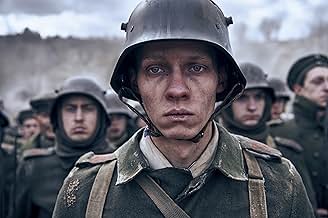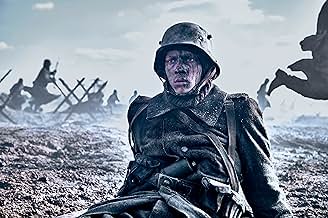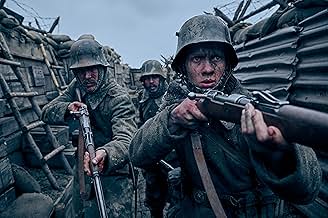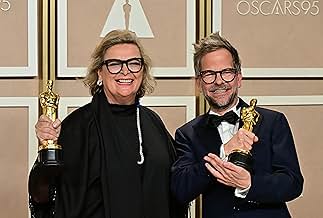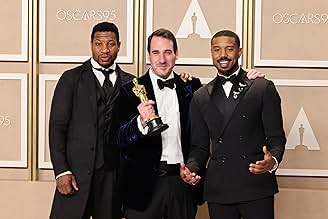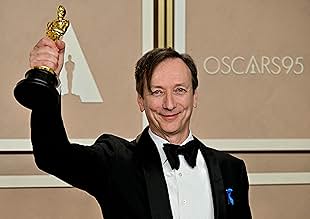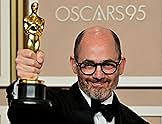Die grauenvollen Erlebnisse und das Elend eines jungen deutschen Soldaten an der Westfront während des Ersten Weltkrieges.Die grauenvollen Erlebnisse und das Elend eines jungen deutschen Soldaten an der Westfront während des Ersten Weltkrieges.Die grauenvollen Erlebnisse und das Elend eines jungen deutschen Soldaten an der Westfront während des Ersten Weltkrieges.
- 4 Oscars gewonnen
- 59 Gewinne & 89 Nominierungen insgesamt
Empfohlene Bewertungen
Just got off watching this Netflix version of the classic.
I vaguely remember the 1979 version with Ernest Borgnine (7/10) and I certainly remember watching the original 1930 film. Both powerful in their own ways. The 1930 film is the best of the three - with first class black & white photography, and all done in that particular way of German story telling. In 1930, the events were very recent - just 13 years previous. Every male over age 30 in German cinemas would have had direct experience. It must have been awful for those audiences to watch the apocalyptic battlefield scenes - still some of the most graphic and numbing ever filmed. My rating 8/10.
So how does this one from Netflix in 2022 stand up then? Well sadly, not that tall.
It's bleak, graphic, actually depressing. An assault on the senses. Sure - it really conveys the impression of the horrors and desperation of trench warfare. But that's all. Maybe that's all it's supposed to do? Maybe that's, as a matter of fact all there was: mayhem and horror? There's nothing to redeem it. Again - that's the point: there's nothing good or glorius about war. Only the opposite.
The men who went to war then, as now, are not all evil men bent on barbarism and terror. All Quiet on the Western Front (all versions) shows us that those who go to war are just normal people - people like you and me. Good people go to war. Normal people. They end up having to see terrible things, do terrible things, to kill or be killed. That's the stark reality. This film certainly shows us that, but there is no upside, no redemption. There are little glimpses of humanity in the friendships, but that's all.
I vaguely remember the 1979 version with Ernest Borgnine (7/10) and I certainly remember watching the original 1930 film. Both powerful in their own ways. The 1930 film is the best of the three - with first class black & white photography, and all done in that particular way of German story telling. In 1930, the events were very recent - just 13 years previous. Every male over age 30 in German cinemas would have had direct experience. It must have been awful for those audiences to watch the apocalyptic battlefield scenes - still some of the most graphic and numbing ever filmed. My rating 8/10.
So how does this one from Netflix in 2022 stand up then? Well sadly, not that tall.
It's bleak, graphic, actually depressing. An assault on the senses. Sure - it really conveys the impression of the horrors and desperation of trench warfare. But that's all. Maybe that's all it's supposed to do? Maybe that's, as a matter of fact all there was: mayhem and horror? There's nothing to redeem it. Again - that's the point: there's nothing good or glorius about war. Only the opposite.
The men who went to war then, as now, are not all evil men bent on barbarism and terror. All Quiet on the Western Front (all versions) shows us that those who go to war are just normal people - people like you and me. Good people go to war. Normal people. They end up having to see terrible things, do terrible things, to kill or be killed. That's the stark reality. This film certainly shows us that, but there is no upside, no redemption. There are little glimpses of humanity in the friendships, but that's all.
A fascinating film with potential that was never fully achieved. "All Quiet on the Western Front" does not rely solely on shock value to disturb its audience; instead, it uses the horrors of war to sober them with facts and dismal realities. The film's story was worth telling; it left an impression long after the credits rolled. It dealt with many weighty themes, including a young man's journey through war, the difficulties of combat, the cruelty of desperation, and the value of friendship and camaraderie, all of which were handled with grace and artistry. Furthermore, it boasted first-rate production values, breathtaking visuals, a terrific score (although maybe a tad bit over the top), and stellar acting. Although there is much to praise about the film, "All Quiet on the Western Front" is ultimately hampered by its drawn-out length, the plot dragging in spots, and several confusing moments. All the pieces were in place for "All Quiet on the Western Front" to be the best picture of the year, and in some respects, it is. Fans of the genre, or anyone who appreciates a well-made film, should not miss this film despite its limitations.
Rating: 7.5/10 (Impressive)
Rating: 7.5/10 (Impressive)
Germany, May 1917. 17-year-old Paul Baumer enthusiastically enlists in the German army and heads off to war. His head is filled with patriotism, honour, visions of heroism and the confidence that Germany will win the war. He soon learns that his impressions of war are far from the reality.
Erich Maria Remarque's "All Quiet on the Western Front" was first published in 1929. It was quite revolutionary, depicting the horrific reality of war rather than the glamourous, sanitised version. In a sense it was the first anti-war novel. It was so unflinching in its portrayal of WW1 that the Nazi party regarded it as treasonous and had the book banned and stripped Remarque of his German citizenship, causing him to flee to Switzerland and ultimately the US.
In 1930 Hollywood made the book into a movie. It was superb, capturing well the horrors that Remarque depicted in his book. It deservedly won the Oscar for Best Picture (and Best Director) in 1930.
In 1979 it was adapted again, this time as a made-for-TV movie. Despite being directed by Delbert Mann and boasting a star-studded cast (Richard Thomas, Ernest Borgnine, Ian Holm, Donald Pleasance) this version was far from being in the same league as the 1930 version and didn't do the book justice. It is quite tame and the performances are quite subdued.
This, the 2022 version, once again captures the essence of the book and is quite unflinching in its portrayal of war. Graphic scenes and realistic plot show the wastefulness and horror of war.
Not as good as the 1930 version though: the characters aren't as fully developed, limiting engagement, and the plot feels a bit padded. A few drawn out scenes could easily have been shorter without losing any detail. Some style-over-substance elements too as the director went overboard with the special effects he had at his disposal (the French counter-attack with tanks and flamethrowers is a good example). The droning sound didn't help either (clearly the director has watched Christopher Nolan's "Dunkirk").
Erich Maria Remarque's "All Quiet on the Western Front" was first published in 1929. It was quite revolutionary, depicting the horrific reality of war rather than the glamourous, sanitised version. In a sense it was the first anti-war novel. It was so unflinching in its portrayal of WW1 that the Nazi party regarded it as treasonous and had the book banned and stripped Remarque of his German citizenship, causing him to flee to Switzerland and ultimately the US.
In 1930 Hollywood made the book into a movie. It was superb, capturing well the horrors that Remarque depicted in his book. It deservedly won the Oscar for Best Picture (and Best Director) in 1930.
In 1979 it was adapted again, this time as a made-for-TV movie. Despite being directed by Delbert Mann and boasting a star-studded cast (Richard Thomas, Ernest Borgnine, Ian Holm, Donald Pleasance) this version was far from being in the same league as the 1930 version and didn't do the book justice. It is quite tame and the performances are quite subdued.
This, the 2022 version, once again captures the essence of the book and is quite unflinching in its portrayal of war. Graphic scenes and realistic plot show the wastefulness and horror of war.
Not as good as the 1930 version though: the characters aren't as fully developed, limiting engagement, and the plot feels a bit padded. A few drawn out scenes could easily have been shorter without losing any detail. Some style-over-substance elements too as the director went overboard with the special effects he had at his disposal (the French counter-attack with tanks and flamethrowers is a good example). The droning sound didn't help either (clearly the director has watched Christopher Nolan's "Dunkirk").
Never expected a netflix movie to shake me to my core but this film kept me frozen in my seat even after a few minutes into the ending credits. It made me think about war and what it does to people. Just as the book had done. But this time due to the superb acting, marvelous cinematography and flawless direction that feeling will stay with me for a long time. They took a great desicion by using an all German cast which made it feel ever more real. And the way they made me feel connected to the charecters. I mourned each one of them and kept praying for the movie to be war soon ,so they could get a happy ending.
This is not strictly-speaking an adaption of Erich Maria Remarque's classic. A few minor incidents from the novel are included, but Remarque's biggest contribution to this film is the title. Given the ending of the film (as opposed to the book) the title is somewhat misleading, but it's such a classic that the film-makers' decision is quite understandable.
This is a brutal and uncompromising study of the realities of war. The fact the the war depicted took place more than a hundred years ago doesn't make it any less relevant. It could be shown in Ukraine today, and soldiers on both sides would understand.
Nor is the film's anti-war message terribly new. It is, however, a message that needs to be repeated over and over again, until (maybe) enough people take it seriously.
The battle scenes are appallingly visceral - possibly the best of their type since the opening of Saving Private Ryan.
The history of any war is written by the winners, but that doesn't stop them being a tragedy for the poor grunts on the losing side as well.
This is a brutal and uncompromising study of the realities of war. The fact the the war depicted took place more than a hundred years ago doesn't make it any less relevant. It could be shown in Ukraine today, and soldiers on both sides would understand.
Nor is the film's anti-war message terribly new. It is, however, a message that needs to be repeated over and over again, until (maybe) enough people take it seriously.
The battle scenes are appallingly visceral - possibly the best of their type since the opening of Saving Private Ryan.
The history of any war is written by the winners, but that doesn't stop them being a tragedy for the poor grunts on the losing side as well.
Wusstest du schon
- WissenswertesErich Maria Remarque's book was inspired by his own experiences as a German soldier in World War I. Remarque fought in the trenches and the novel is notable for its realistic depiction of the horrors of battle, and the trouble soldiers face during and even after the fighting.
- PatzerBy the end, Germany's delegation to Rethondes appears indignant as the terms and conditions of armistice are quoted by Mathias Erzberger, namely forfeiting submarines, planes, weapons and so on; what is read there was not in the November 11, 1918 capitulation act but was imposed upon Germany next year in the Treaty of Versailles.
- Zitate
Matthias Erzberger: All that's left separating us from an armistice is false pride.
- VerbindungenFeatured in Business Now: Folge vom 19. Oktober 2022 (2022)
- SoundtracksEbben? Ne andrò lontana ('La Wally', Act 1)
Written by Alfredo Catalani and Luigi Illica
Performed by Maria Luigia Borsi
Top-Auswahl
Melde dich zum Bewerten an und greife auf die Watchlist für personalisierte Empfehlungen zu.
Details
- Erscheinungsdatum
- Herkunftsländer
- Offizieller Standort
- Sprachen
- Auch bekannt als
- Sin novedad en el frente
- Drehorte
- Produktionsfirmen
- Weitere beteiligte Unternehmen bei IMDbPro anzeigen
- Laufzeit2 Stunden 28 Minuten
- Farbe
- Sound-Mix
- Seitenverhältnis
- 2.39 : 1
Zu dieser Seite beitragen
Bearbeitung vorschlagen oder fehlenden Inhalt hinzufügen





